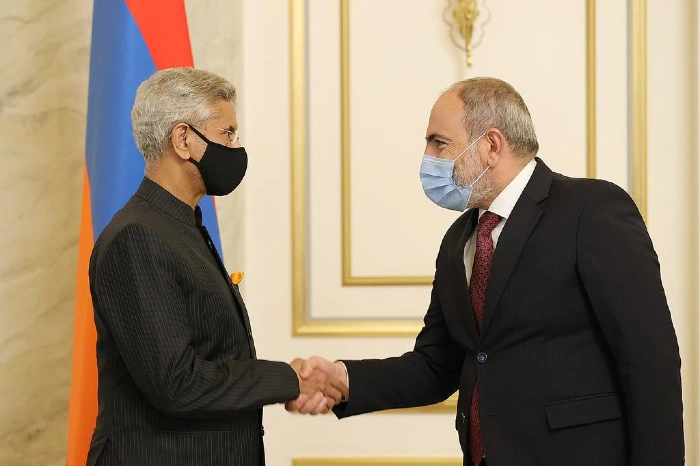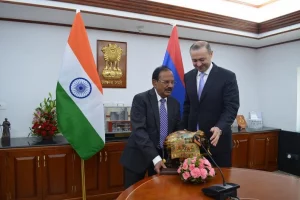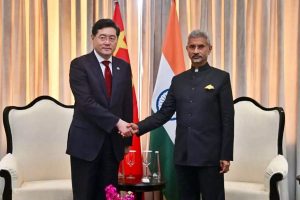India and Armenia today agreed on enhancing trade, education, cultural exchanges and connectivity through the International North South Transport Corridor (INSTC) by utilization of the Chabahar port in Iran which is being developed by New Delhi.
In the first-ever visit to Yerevan by an External Affairs Minister (EAM) of India since the independence of Armenia, S Jaishankar discussed extensively with his counterpart Ararat Mirzoyan a detailed roadmap to take the bilateral cooperation between the two countries forward.
Describing his interaction as "warm and productive", Jaishankar, in a significant gesture, also acknowledged that Armenia has gone through "a very difficult phase" last year and conveyed India's "sincere condolences" to the Armenian people.
The fighting between Armenia and Azerbaijan in the Nagorno-Karabakh conflict zone has reportedly killed thousands and left over a lakh displaced.
India has maintained a consistent position with regard to the disturbances in the Caucasus region, calling for peaceful resolution of the conflict through diplomatic means right from the beginning of the hostilities.
"We have expressed support for resolution of the dispute under the OSCE Minsk Group. We have supported the trilateral ceasefire of 9/10 November 2020. India has always been in favour of peace and stability in this region," Jaishankar said in the Armenian capital on Wednesday.
Co-chaired by France, Russia and the United States, the Organisation for Security and Cooperation in Europe (OSCE) Minsk Group – the activities of which have become known as the Minsk Process – spearheads the organisation's efforts to find a peaceful solution to the Nagorno-Karabakh conflict.
Both Jaishankar and Mirzoyan also discussed ways to further strengthen the economic and commercial cooperation, particularly in the fields of tourism, hospitality, infrastructure and investment.
"Armenia is a member of the Eurasian Economic Union (EaEU) and we are currently negotiating a Trade Agreement with EaEU and I am sure that it will boost our trade relations," said the EAM emphasising that more engagement between the business community, the chambers and trade bodies on both sides will give further impetus to bilateral trade and commerce.
Strengthening two C's – Connectivity and Cultural exchange
As reported by India Narrative a few days ago, Jaishankar's mission to Eurasia – Armenia is his last stopover before returning home after visits to Kyrgyzstan and Kazakhstan – is to also make sure that the return of Taliban in Kabul does not dismantle the grand 7200 km NSTC project.
Armenia, a key member of the project to establish the vast pan-Eurasian transport network, has shown keen interest in utilization of Chabahar port which India is pushing to include in the INSTC framework. The landlocked country's economic ambitions are expected to get a fresh lease of life through the unique initiative.
"We definitely like to welcome the use of Chabahar port and any other initiative that could increase connectivity between our two countries. We also discussed the possibilities of direct flights between our two countries under our Air Services agreement," said Jaishankar.
The External Affairs Minister, who had after landing in Yerevan on Tuesday evening tweeted his excitement of seeing "a historical connection" with his home state of Tamil Nadu, discussed today the importance of nurturing the bonds between the two nations.
He highlighted that the relations between the two countries go back several centuries with recorded history of presence of Armenian diaspora in India from the medieval times.
There is presence of rich Armenian heritage with churches, cemeteries and educational institutions in Kolkata, Chennai, Mumbai and Agra, where the first Armenian Church was consecrated in 1562.
The Armenia -India connect so visible in the Matenadaran library in Yerevan.
First Armenian newspaper and constitution that were published in Madras(Chennai). pic.twitter.com/5Q2l6wNoaK
— Dr. S. Jaishankar (@DrSJaishankar) October 13, 2021
"In fact, a stamp was issued by Armenian Post in the early 1990s of a Church in Chennai, then Madras, which is where my family comes from, which is firmly etched in my memory," said Jaishankar while calling the contribution of the Armenian community to India's progress noteworthy.
After starting Wednesday by paying homage at the Tsitsernakaberd Memorial Complex, Jaishankar also met Armenian Prime Minister Nikol Pashinyan and the President of the National Assembly of Armenia Alen Simonyan later in the day.

Along with Mirzoyan, he also paid homage to Mahatma Gandhi at his statue in Yerevan with both ministers planting a 'tree of friendship' at the venue. With Armenia boasting of the presence of over 3000 Indian students, most of them pursuing medical education, Jaishankar also held an interaction with the youngsters.
"Wonderful to see Indian students and Armenian friends of India in Yerevan. Appreciate the efforts made by the Government of Armenia for the welfare of our students," he tweeted.




















